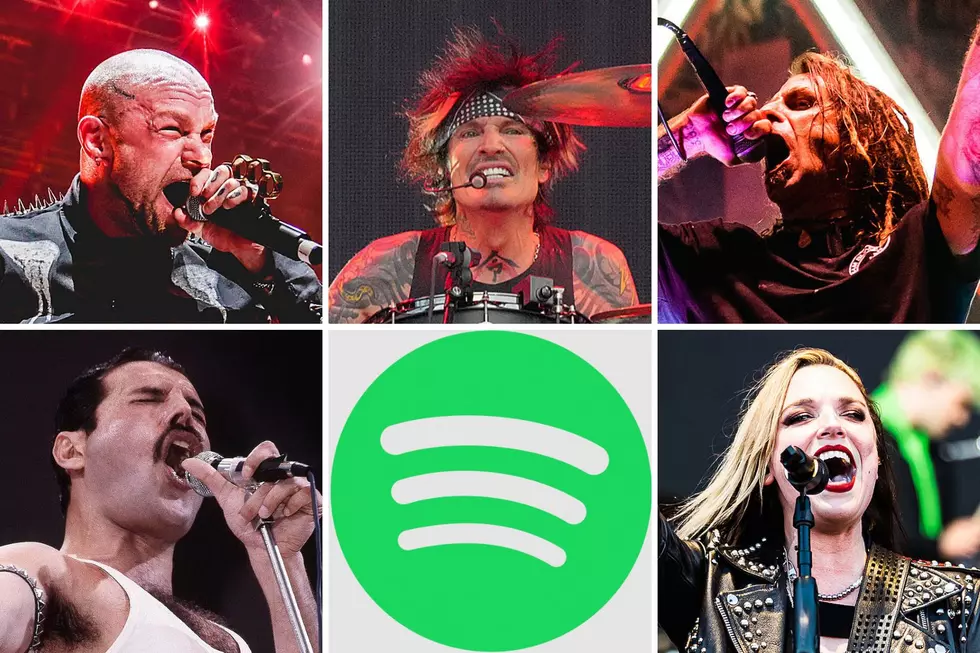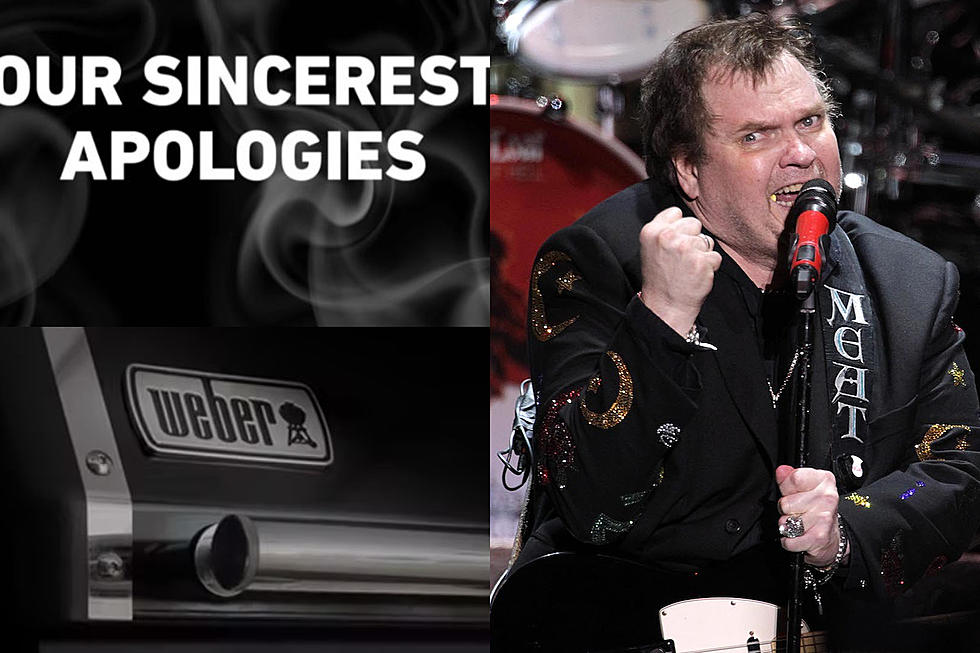
Scott Ian on His New Radio Show, Next Book and Anthrax’s Legacy: Exclusive Interview
Few metal musicians keep themselves as busy as Scott Ian. The founding member and guitarist of Anthrax recently launched a show on SiriusXM’s Volume channel 106 called Never Meet Your Heroes where he interviews some of his contemporaries and pop-culture idols. So far he’s spoken with Slipknot and Stone Sour frontman Corey Taylor, Alice in Chains guitarist Jerry Cantrell and Fozzy’s Chris Jericho.
Ian is also working on a follow-up to his 2014 autobiography I’m the Man: The Story of That Guy From Anthrax, has spent the past couple years doing a spoken-word tour and earlier this year released Anthrax's 11th album, For All Kings. The band is currently gearing up for a European jaunt that kicks off in early February.
Taking time of out his hectic schedule, Ian sat down to discuss the differences between hosting a radio show vs. television, being an East Coast thrash band and why this is the final lineup of Anthrax.
Why did it take you so long to end up hosting something like Never Meet Your Heroes? It seems like something you’d be a natural at doing.
Well, I wasn’t out there looking for it until somebody called me from Sirius and asked if I’d be interested. They launched this Volume channel of all talk about music. There are some people up there who have seen my talking shows, and I guess felt the same way -- that I’d be right for their channel.
Interviewing musicians is obviously nothing new for you, having done The Rock Show all those years ago for VH1, but what do you see the differences being between that and the radio show – other than being on TV?
I don’t really know yet, I’ve only done two! The Rock Show was so long ago … but having done two, I’d say radio is a bit easier – just from a technical standpoint. I’m not doing live radio, so you hit "record" and you go, there’s no constraints. When we were doing The Rock Show, it wasn’t live, obviously, but still, all the segments were very timed out. You’re waiting for setups and lighting and camera blocking and audio and makeup; there’s a whole lot more that goes into a TV production then a radio production, let’s put it that way – because there’s no visual.
Are you filming any of the show?
No. Because Sirius doesn’t do, as far as I know, other than Howard [Stern] – and maybe [Faction host] Jason Ellis – but I’m not even sure. It’s not like they have all their shows up on the site where you can see them. Or maybe they do … maybe I’m completely ignorant to it and we’re just not doing it. That’s a question I’ll ask, “Are we ever gonna film these?”
The show is one more project you’ve done outside of music. You mentioned the talking shows, and at one point you co-owned a bar [with Alice in Chains’ Jerry Cantrell], you did the VH1 reality show and you wrote a book. Do you have anything else that you’re set on doing?
I just really like to write; writing is pretty much my favorite thing to be able to do. I’m writing a second book right now, writing my own stories and my own stuff, and the publisher was nice enough to green-light a second one. But I’d like to write more, whether it be for comics or movies. It’s not something I’ve gone out and pitched myself for at all, because I just don’t have the time now. Maybe when I do have the time I’ll have honed my abilities a bit more, and maybe I’ll have an idea to go pitch to somebody.
What is the gist of the second book?
It’s all stories that didn’t fit into the flow of the first book. The first book is an autobiography and, at least for me, there’s a certain flow to that and the way I wanted the story to move along at a really quick pace. There’s just a lot of stories I had written that just really didn’t fit into it – not because they were to tangential, but because I felt they were kind of taking you away from the path a little bit too much. That’s where I ended up with a whole list of really great tales that just didn’t work in the first book, but in a book full of stories? They’re gonna be great.
One of the things that stuck out to me in your first book was how you completely blew off the whole situation with former Anthrax singer Dan Nelson. You didn’t even mention his name and basically said if people want to know more about it, they can research it themselves. Are your feelings still that bitter after all these years?
It had nothing to do with bitterness. We signed an NDA [non-disclosure agreement], and that’s the end of that.
Looking back at the craziness that Anthrax went through in 2009, are you glad you ended up with Joey [Belladonna]?
Of course.
With Joey, one of the things you have to deal with is something -- I guess along the lines of Van Halen -- and that’s a large portion of your catalog gets ignored live. Is that frustrating for you as a musician – and as a writer of so many of the Anthrax songs – that you don’t get to play them live?
No ... we have more than enough material between Spreading the Disease and Attack of the Killer B’s and then Worship Music and For All Kings, we have more than we can play. Right now our whole focus is just getting more For All Kings songs together and tight so we can play those.
When you did Return of the Killer A’s, it looked for a bit like you were going to go on tour with Joey and former singer John Bush. Obviously that didn’t happen, but do you ever see that happening down the line at some point?
No. And there’s no negativity. We’re a band, and we’ve been this band since 2010 and this is the band we’re going to be until there is no more band.
As a writer, what was the approach going into For All Kings as opposed to Worship Music?
Just the attitude of the band. Worship Music was written over a period of years, when we didn’t even have a band together, when we first started writing that record. It’s just two completely different situations. Worship Music, [drummer] Charlie [Benante] and I started writing that record when it was just the two of us at his house working on material. We were the only ones left in the band at them time. And, of course, the band comes back together and Joey rejoins and so on and so on. For All Kings was written in a time period where Worship Music came out, connected with people all over the planet, and we did about 300 shows and the attitude of the band was extremely positive and we felt like things were really great around us.
More like a band.
Well, yeah – we were a band. We knew who the five people were who were going to be performing on the record. That makes a big difference as compared to when you’re just writing and writing and eventually it all comes together and you redo it and redo it; because we redid a lot of stuff when Joey rejoined the band again. I just recently found, oddly enough, on an old hard drive, versions of songs like “Fight ‘Em ‘Til You Can’t” from a rehearsal that we did the night before the first Big Four show in Poland and the arrangements were really different – I couldn’t even remember, like, “Wow! When did we play the song like that?” It was just completely alien to me because we rewrote stuff and then went in and rerecorded stuff with Joey in mind. It’s just so weird to go back and listen to these weird versions of some of those songs I completely forgot about.
One of the things I’ve always been curious about is out of the Big Four, you’re the only East Coast band. How does that set you apart, not just from the Big Four, but other thrash bands in general; because there’s a whole different mentality here on the East Coast than there is out west.
Is there? What’s the different mentality? What was the different mentality in San Francisco in 1982? I don’t know if anyone has done an anthropological study on that when it comes to metal bands in those cities in 1982, but I don’t know if there was a difference. If there was, I can’t tell you what it is – I have no idea. I really don’t know. I can’t tell you why there weren’t more bands doing what we were doing on the East Coast. No idea – not a clue. There was Overkill, but they weren’t really a thrash band yet at that point in time. Once I started meeting people from the West Coast bands in late ’82, early ’83, I didn’t see much of a difference at all.
It’s weird then, metal seems to be one of the only genres like that where, like, you have East Coast rap and West Coast rap – and you can hear the differences in it. You have soul that comes from Motown, different from Stax Records, different from the Sound of Philadelphia. Metal, it doesn’t really matter where you’re from, is what you’re saying.
I don’t know; although I did ask Corey on my show, “If Slipknot wasn’t from Iowa, would you have become Slipknot? If you grew up in New York or you grew up in L.A. … ” And he was able to answer that question and say, “Absolutely not.” They would’ve been completely different humans; their environment had everything to do with the band that they became. I feel like I would’ve done whatever I was gonna do no matter where I grew up. I don’t necessarily feel that New York is the reason I wanted to start a band. I feel like I would’ve wanted to start a band anywhere I would’ve grown up in the world – as long as I would’ve heard music as a kid. As long as I grew up somewhere that had electricity, I think I would’ve done what I’ve done anyway. It’s different for everybody really.
Anthrax already has its position cemented in metal, but what do you want the legacy of the band to be when all is said and done, when you’re not touring anymore and you’re sitting on a rocking chair on writing your fifth book?
I don’t know … I guess we’ve always done things exactly how we’ve wanted to, I’ve had a 35-year career so far, without having to answer to anybody but myself or my band members. That’s pretty much all I ever wanted out of life: to be able to play music and have a job that I would want to go to everyday and not be stuck somewhere that I hated. Not have a boss, you know? I guess just the fact that we always did what we wanted to.
See Anthrax and Other Rockers in the Top 50 Heavy Metal Albums of All Time
More From KYBB-FM / B102.7










